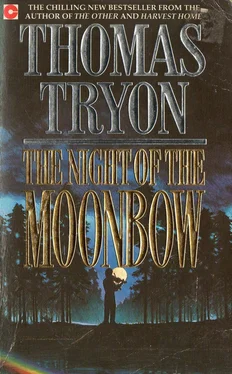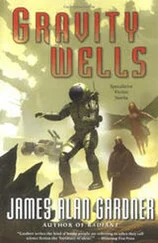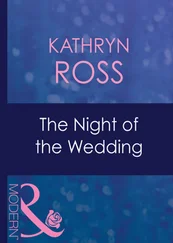Thomas Tryon - The Night of the Moonbow
Здесь есть возможность читать онлайн «Thomas Tryon - The Night of the Moonbow» весь текст электронной книги совершенно бесплатно (целиком полную версию без сокращений). В некоторых случаях можно слушать аудио, скачать через торрент в формате fb2 и присутствует краткое содержание. Жанр: Триллер, на английском языке. Описание произведения, (предисловие) а так же отзывы посетителей доступны на портале библиотеки ЛибКат.
- Название:The Night of the Moonbow
- Автор:
- Жанр:
- Год:неизвестен
- ISBN:нет данных
- Рейтинг книги:3 / 5. Голосов: 1
-
Избранное:Добавить в избранное
- Отзывы:
-
Ваша оценка:
- 60
- 1
- 2
- 3
- 4
- 5
The Night of the Moonbow: краткое содержание, описание и аннотация
Предлагаем к чтению аннотацию, описание, краткое содержание или предисловие (зависит от того, что написал сам автор книги «The Night of the Moonbow»). Если вы не нашли необходимую информацию о книге — напишите в комментариях, мы постараемся отыскать её.
The Night of the Moonbow — читать онлайн бесплатно полную книгу (весь текст) целиком
Ниже представлен текст книги, разбитый по страницам. Система сохранения места последней прочитанной страницы, позволяет с удобством читать онлайн бесплатно книгу «The Night of the Moonbow», без необходимости каждый раз заново искать на чём Вы остановились. Поставьте закладку, и сможете в любой момент перейти на страницу, на которой закончили чтение.
Интервал:
Закладка:
“Yes,” he had said, thinking how silly she was, Elsie Meekum. Foolish words just seemed to come bubbling out of her like Nehi rootbeer when you shook up the bottle.
But there was a bridge, wasn’t there? And carbonated though she might be at times, Miss Meekum was also often wise and prudent. He must remember.
“And be truthful at all times,” she went on. “You know your penchant for – exaggeration.”
“Yes,” he said.
“And don’t forget to practice your music, practice every day. You’ll be rewarded and the boys will like you for it. Play that pretty Paganini piece you’ve worked so hard on. Promise, now.”
Yes, he promised again. He was always promising her. Following these cautionary words there was further bounty as she presented him with, first, a fake tortoiseshell toothbrush holder, then a blue-covered spiral notebook with lined pages, a fountain pen, and a bottle of Parker blue-black Quink.
“Take these, my dear, and keep a record of the happy time that lies ahead of you,” she said. “A few jottings every day, and long afterward, when you are older, you will be glad to have such a memento.” She thrust out her face to kiss him.
He had shivered at the touch of her withered lips, unused as he was to such intimate contact, and his eye caught the flecks of her pink face powder as they sifted from her cheeks. Poor, shriveled, woebegone Miss Meekum – yet he honored her gende claim on him, for who else was there for him to love?
Besides, he owed her; he knew that. Owed her plenty. Foolish, flat-chested spinster though she was, she’d proved a mother to him when he’d had no other, w ^ r hen his own mother was gone… gone across the L Street Bridge.
Suddenly he was sobbing, his body racked by painful spasms. Stop, he told himself, don’t be such a jerk. She’s dead and gone – dead and gone, and where’s the help for that? Who had the magic to bring her back? He lifted his tearstained face and pulled away bits of straw and grass. This wouldn’t do, wouldn’t do at all. If there was one thing he couldn’t stand, it was a crybaby.
Once more, high in the sycamore tree, the mockingbird offered its lighthearted song, its practiced notes interrupting his thoughts. He stiffened his spine, staring at the violin in his hand. If he wasn’t going to practice baseball he had better practice some more music – not just because he’d promised Miss Meekum he would but because he had been entered as a solo performer in the Major Bowes Amateur Night contest. He was a cinch to take a prize, Tiger had declared, and if he did he’d win extra points for Jeremiah. Extra points meant Reece would be pleased, and if Reece was pleased, everybody would be pleased.
Taking up his violin again, he fiddled an impromptu accompaniment to the mockingbird’s song, and when the singing stopped, Leo went on, segueing into an old favorite: “Poor Butterfly.” Of all the tunes from his earlier years, the ones his mother used to sing to him, this was the song he knew best. It had been her favorite; she’d heard it in a Broadway musical show she’s seen back during the World War. Such a wistful song, too; she always said it made her want to cry. Now, though she was gone, he remembered the song and played it often.
Poor Butterfly!
’Neath the blossoms waiting the words went,
Poor Butterfly!
For she loved him so.
Leo had loved that song from the first moment. He loved watching his mother as she played it, her pale lids fluttering, a little blue vein beating in her temple, her eyes shining – until there would come the brutal knocking from downstairs in the butcher shop; he would be pounding the broom handle on the ceiling, telling Emily to shut up, the noise was driving him crazy.
He rolled over and fingered his wallet out of his back pocket, then wiped his thumb and finger on the roll of his shorts and carefully extracted her photograph from one of the glassine windows. He held it with the utmost delicacy, for one corner was badly dog-eared, and the paper was in danger of cracking. The photo had been taken behind the pleated curtain of the little automatic picture booth by the entrance to Kresge’s 5 amp; 10 – four shots for a quarter, ten cents more for “artistic hand tinting.” “Smile, Mom,” he had told her, but she wouldn’t, she didn’t like showing her uneven teeth. What the camera had therefore captured was this other, gentler, and more tender smile, filled with caring and a pensive yearning – a trifle fearful too, the least tinge of anxiety in the eyes, those large, deep-set eyes.
He could see her still, her face framed in that high curved window that looked down on Gallop Street, watching for him as he came up the street from school, when she would smile and wave behind the glass. She would hurry down the hall stairs, finger to her lips to tell him that he shouldn’t make noise and tip off Rudy, who, if he knew Leo was home, would make him fetch the broom and sweep the butcher shop. “Come upstairs,” she would whisper, and there she’d have a treat waiting, hot chocolate and cinnamon toast on cold days, lemonade and cookies on warm ones.
On rainy days they would sneak up into the attic together, where they would go through boxes and old trunks, or she would read to him, fanciful stories, from Palfrey’s Golden Treasury or Hawthorne’s Tanglewood Tales, while he sat by her side and poured over the colored plates tipped in among the pages and protected by opaque sheets of paper, illustrations of Aladdin with his magic lamp; of Ali Baba in the cave of the Forty Thieves; of Robert the Bruce, whose kingdom hung on the gossamer thread of a single spider; of Daedalus and Icarus, and Theseus killing the Minotaur.
She was always thinking of things to amuse him, like taking him to the double bill at the matinee (despite Rudy’s objections), to The Big Trail and Min and Bill, maybe the latest Gold Diggers, or to Cimarron. Sometimes they’d visit the merry-go-round in the park, where a couple of times they’d accidentally happened across a friend of Emily’s, Mr Burroughs, a nice gentleman who bought Leo a balloon and a box of saltwater taffy and suggested that Leo not mention their fun to Rudy. But Leo didn’t need any prompting, because he never told Rudy anything. He hated Rudy. Always, after school, while picking up scraps of fat from the floor, he would watch him, surly and frowning under his trademark straw hat, his strong, hairy hands wielding the sharp-edged cleaver, a cigar butt plugging the corner of his lips like a cork in a jug. The sight of him in his long butcher’s apron, blotched with the blood of dead animals, made Leo sick at his stomach.
Rudy didn’t like Leo either; didn’t want him around, and he resented the time Emily spent with him, accusing her of making a sissy out of the boy. One night, when he went up to bed and failed to find his wife waiting for him, he went to look for her. Hearing voices from Leo’s room, he came rushing in and, yanking her out of the chair, flung her against the wall in a jealous rage, shouting that the boy was a mollycoddle and would grow up worthless. Leaving Emily, he rushed at Leo and dragged him to the window, where he threw up the sash, and turning Leo upside down, dangled him over the windowsill by his heels.
Below Leo, the world was spinning around; he was sure his end had come. The ground seemed to swirl up to meet him, making him sick, and Emily was struggling with Rudy, trying to drag Leo inside. Finally Rudy let go, and Leo felt himself falling! Falling down and down – a moment later he was safe in Emily’s arms. She soothed him and said it would be all right, while Rudy went around kicking the furniture. But when Leo was put to bed again and left alone, the panic rose in him and he lay there sweating, afraid to shut his eyes, for as soon as he did he saw himself looking down from a great height, and then he would start to fall, over and over, endlessly falling, falling… falling
Читать дальшеИнтервал:
Закладка:
Похожие книги на «The Night of the Moonbow»
Представляем Вашему вниманию похожие книги на «The Night of the Moonbow» списком для выбора. Мы отобрали схожую по названию и смыслу литературу в надежде предоставить читателям больше вариантов отыскать новые, интересные, ещё непрочитанные произведения.
Обсуждение, отзывы о книге «The Night of the Moonbow» и просто собственные мнения читателей. Оставьте ваши комментарии, напишите, что Вы думаете о произведении, его смысле или главных героях. Укажите что конкретно понравилось, а что нет, и почему Вы так считаете.












